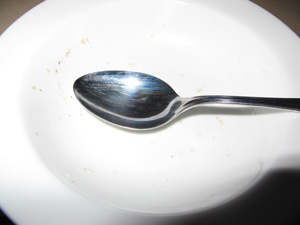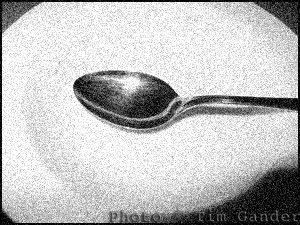Q: Is every photo I take covered by copyright?
A: Possibly not.
That’s some seriously dangerous thinking by a photographer who staunchly believes that copyright is the lifeblood of this industry, but I think it might be true. So let’s lift the lid on this spectacularly large can o’ worms and see what spills out.
Copyright in the UK is under serious threat. The rather tainted conclusions of the Hargreaves report aim to persuade the UK Government to introduce orphan works legislation, which in tandem with something called extended collective licensing, will allow large corporate organisations to profit from the millions of un-attributed photos currently found on line or stored in ready-made databases (the BBC likes to collect peoples’ photos and then orphan them).
This concept is full of gaping holes ready to be filled by law suits, but I’m almost hoping the legislation comes to pass just so the Government can finally be forced to understand quite how incompetent Hargreave’s review has been with regard the protection of photographers’ copyright and moral rights. I fear nothing less than legal chaos will get them to see sense.
But back to the idea that not every photo I (or you) take is necessarily covered by copyright…
The starting point for copyright in the UK is that it is automatic in any new work. You take a picture; it’s copyright. You don’t have to register it or even declare it’s status as copyright. It just is. But take a look at this clause from the UK copyright law fact sheet:
“Copyright is an automatic right and arises whenever an individual or company creates a work. To qualify, a work should be regarded as original, and exhibit a degree of labour, skill or judgement.”
That’s interesting, because what it means is that if you can’t show that a photo you have taken exhibits a degree of labour, skill or judgement, it may be it isn’t covered by copyright.
Note the “or” in that clause though. A photo could be the product of only one of labour, skill or judgement and it would benefit from copyright protection. It would have to be lacking in all three in order not to qualify.
Presumably this is so that people can’t copyright everyday objects in order to prevent their wider use. I can’t copyright a blank piece of A4 paper, then sue anyone who writes a letter on blank A4 paper by citing their work as derivative of my copyright work. Equally I can’t take a photo of a famous landmark, then try to prevent anyone else from doing the same by citing my copyright. Each person who photographs that landmark will own the copyright in their photo of it, not in the scene itself. This point is stretching a little far now, since the photo of a landmark is the “realisation” of the scene, and it’s the realisation of a scene or idea which has copyright vested within it, not the scene or idea itself.
So getting back on track to my point (yet again), when would a photograph not exhibit a degree of labour, skill or judgement? Well presumably when the photographer hasn’t chosen the angle, chosen the camera settings, which lens or focal length to use and hasn’t judged the scene with any degree of care. You could almost argue that someone holding an iPhone up to snap a view has done none of these things and might therefore not have the protection of copyright for their picture.
Dammit; worms everywhere. Discuss amongst yourselves while I fetch the dustpan and brush.



This argument is older than the current debate about the future of copyright. It started really when the “modern art” movement gained public recognition (at any time from around 1890 onwards, really), and the reaction of Joe Public to a given work of art was “My 6-year-old could have done that”. The artist’s response to that was “But your 6-year-old didn’t do that. I did, and it’s art.”
Taken to its extreme, though, this can get into all sorts of Byzantine arguments, when artist A uses artist B’s commercial work as a “found object” or uses the argument “That’s not art, it’s a book cover”.
As ever, the real winers are usually the lawyers.
Time to retrain in law, I think…
Thanks for contributing Robert.
Or probably “winners”. OTOH, in typo veritas…
Hi Tim, I have been reading your blogs but have been on the road having a holiday so I had to decide between writing a comment or drinking beer with mates.
Anyway onto this weeks blog – I have never come across a more slippery bunch of worms than British politicians, never let it be said that they make anything simple and clear, they have so many hidden agendas that at times it is a wonder anything gets signed into legislation.
Anything that does get signed in is so warped and twisted from its original purpose nobody can remember what it was all about in the first place.
It will take continued and sustained effort by those who are going to be affected the most to keep pushing the actual point to the top of the crap pile to keep it highlighted. A tough job when there are so many competing agendas from so many different and powerful groups.
A final thought on those powerful groups: When you are up to your arse in alligators it is hard to remember your original purpose was to drain the swamp.
cheers
Ken
Hi Ken, you have mates?! 😉 Hope you had a good holiday though…
I really do fear for the future of the creative individual in this country if what I think they (politicians/big biz) comes to pass. Maybe they believe that getting the gullible people to supply all creative content for free is the way to go. If orphan works and extended collective licensing do come to pass, and I’m sure they will in some form or another, the fun part will be when someone presumes a work is orphan, when thorough checks don’t find the owner, and they go ahead and use it only to have some US-based creator come after them with their certificate of registration from the US copyright office. Who will be to blame then?
Thanks for the rant. Always cheers me up!
I wholeheartedly agree with the statement of law (that being a fact of course!), but do disagree with your interpretation. By example:
If I take a photograph of the Statue of Liberty, that work is copyright – it’s taken me time and effort (i.e. labour) and it’s not permissible for one to rip it off as their own.
If I take a photograph of the Statue of Liberty adorned in mince pies, through a infra-red filter, the image and the concept may well be copyright – this is because a. I took the image, and b. I have created a new idea (to my knowledge no-one has thought to take a photograph of the Statue of Liberty covered in mince pies).
To use your example of the A4 piece of paper – you’re not doing anything new or inventive.
I think every time you hold a camera you’re exhibiting ‘labour’ and arguably ‘skill’ and ‘judgment’ I think the reason for the IP clause is to stop ‘passive’ copyrighting, i.e. just because something I’ve done ‘happens’ does not mean I can copyright it!
I’m open to debate on this though!
Hi Alistair, thanks for commenting. I do make pretty much the same points as you, that a photo of a scene is copyright to the person who takes the photo. I’d like to see the Statue of Liberty covered in mince pies though. That really would be art.
You’re correct that new and inventive is another prerequisite of something having copyright vested in it. Perhaps a better analogy would be picking up a twig, declaring it as your art and claiming copyright in it, which would clearly be ridiculous (though I may have just inadvertently given away the winning entry of the next Turner Prize).
I’m not sure that every time you hold a camera that you’re necessarily exhibiting labour, skill or judgement anymore. If the camera is choosing all the settings, if you simply lift the camera and take a random snap, I think that could be deemed exempt from copyright law, unless it’s felt that your decision and timing to take a random snap constitutes judgement? My head may well explode if I think about this too long.